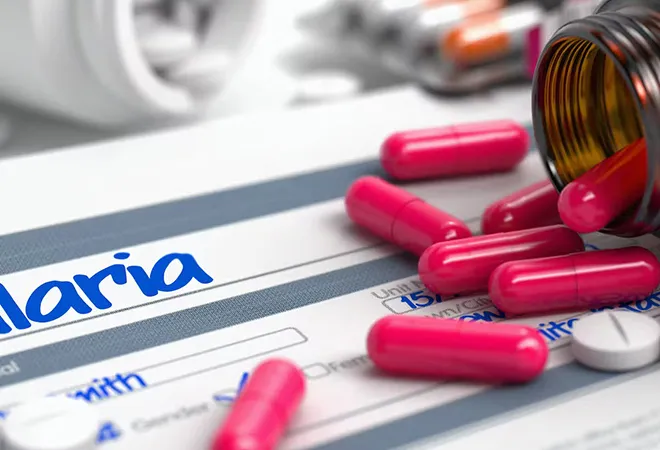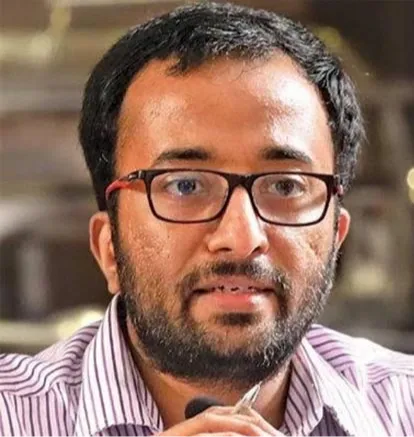-
CENTRES
Progammes & Centres
Location
India plays a pivotal role in the crucial fight against malaria by ensuring the successful production and distribution of the RTS,S/AS01 vaccine

The allocation of an initial supply of 18 million doses of the first-ever malaria vaccine to 12 high-burden African countries, announced on 5 July represents a crucial milestone in the fight against the deadly disease. With a focus on protecting vulnerable children in areas of highest need, the plan for the rollout of malaria vaccines in Africa—to be made in India by Bharat Biotech and Serum Institute—highlights the significant role of India's pharmaceutical manufacturing capacity in enhancing access to health across Africa. Malaria continues to ravage many African communities, resulting in a substantial number of cases and deaths, particularly among children under the age of five. Urgent action is required to address this public health crisis, making the allocation of the first-ever malaria vaccine all the more significant.
Malaria continues to ravage many African communities, resulting in a substantial number of cases and deaths, particularly among children under the age of five.
Despite this major global initiative relying almost exclusively on Indian pharmaceutical manufacturers, it has not received the press coverage it deserves, perhaps a backlash due to a spate of recent events involving alleged contamination in India-manufactured cough syrups. These concerns notwithstanding, India has a leadership position in pharmaceutical exports and is known globally for producing affordable medicines and vaccines, playing a critical role in supplying generic drugs to low- and middle-income countries. When it comes to malaria, India's expertise, large-scale production capabilities, and cost-effective manufacturing techniques will ensure the availability and affordability of the RTS,S/AS01 vaccine being distributed now, developed and produced by GSK, and in the future to be supplied by Bharat Biotech, offering hope to countries with limited healthcare budgets.
Collaboration and partnership are fundamental to the effective implementation of the malaria vaccine. Organisations like Gavi, the Vaccine Alliance, the World Health Organization (WHO), and UNICEF play essential roles in facilitating the distribution process. By working together, Indian manufacturers, including Bharat Biotech, help bridge the gap between vaccine demand and supply, particularly in resource-constrained settings.
The allocation of the first-ever malaria vaccine to African countries signifies a significant stride in protecting vulnerable populations and reducing the burden of malaria on the continent. Building upon the success of the Malaria Vaccine Implementation Programme (MVIP) in Ghana, Kenya, and Malawi, where the RTS,S/AS01 vaccine has been administered since 2019, this initiative has already showcased the vaccine's safety and efficacy, resulting in a substantial reduction in severe malaria cases and child mortality. The programme's success has sparked interest from 28 African countries, underlining the urgent need for expanded vaccine access.
The allocation of the first-ever malaria vaccine to African countries signifies a significant stride in protecting vulnerable populations and reducing the burden of malaria on the continent.
Expanding the vaccine rollout beyond the initial pilot countries, the allocation of doses to additional African nations represents a significant breakthrough in the fight against malaria. Facilitated through the supply of vaccine doses available to Gavi via UNICEF, this allocation brings hope to communities that were previously at risk of malaria-related illness and death. By integrating the vaccine into routine immunisation programmes, these countries can fortify their healthcare systems and protect their populations from the devastating impact of malaria.
India's pivotal role in this effort, driven by its pharmaceutical manufacturing capacity, cannot be overstated. As a renowned global hub for pharmaceutical production, India's expertise, quality of manufacturing, and cost-effectiveness are vital in ensuring the successful production and distribution of the RTS,S/AS01 vaccine, to be manufactured by Bharat Biotech. In addition, the potential prequalification of the R21/Matrix-M vaccine, developed by Oxford University and manufactured by the Serum Institute of India (SII), further enhances India's contribution to malaria vaccine production. With the Serum Institute of India Pvt. Ltd. (SIIPL) leading the manufacturing and commercialisation efforts as the license holder, India's commitment to producing up to 200 million doses annually exemplifies its dedication to supporting global health initiatives, particularly in the fight against malaria.
As the demand for malaria vaccines continues to rise, with projections reaching 40-60 million doses by 2026 and 80-100 million doses by 2030, it is imperative to enhance supply. The collaboration between Indian manufacturers and international organisations like Gavi and the WHO guarantees that the vaccine reaches those in greatest need. The allocation of 18 million doses of the first-ever malaria vaccine to African countries serves as a significant milestone in the battle against malaria. It underscores the importance of international cooperation and India's manufacturing capacity in supporting and sustaining global efforts to eradicate the disease.
The collaboration between Indian manufacturers and international organisations like Gavi and the WHO guarantees that the vaccine reaches those in greatest need.
The allocation of the first-ever malaria vaccine to African countries is the result of a collaborative effort between international organisations and Indian manufacturers. The success of this endeavour hinges on the effective coordination of Gavi, the Vaccine Alliance, the WHO, UNICEF, and other stakeholders. Their collective commitment ensures that the vaccine reaches those in greatest need, particularly in resource-constrained settings where the burden of malaria is most severe. As the world strives to eliminate malaria and protect vulnerable populations, the ongoing collaboration between Indian manufacturers and global health organisations remains crucial. Together, we can overcome the challenges posed by malaria and achieve a malaria-free future for all.
At the absolute level, India, too, faces a malaria burden in some regions but is considered to have “very low transmission” settings of malaria, according to both WHO estimates and the national malaria control programme. At the same time, recent research from the Indian Council of Medical Research (ICMR) and National Institute of Malaria Research (NIMR) has shown that India's surveillance system for malaria remains weak, as it only captures data from the public health sector, potentially underestimating the true burden of the disease. There is a pressing need to evaluate the prevalence of malaria in the private sector and identify hidden cases, such as asymptomatic and subpatent infections, particularly in forested areas. Additionally, the reported number of malaria-related deaths is minimal, but this may not reflect the actual severity of the disease due to underreporting of severe cases and limited access to adequate healthcare, especially in rural regions. Comprehensive studies are necessary to accurately estimate the prevalence of severe malaria cases in the community.
For these reasons, the implications of the recently recommended malaria vaccine RTS,S/AS01 for India need careful assessment. While India is categorised as a low-transmission setting, the country's weak surveillance system may underestimate the true burden of malaria, calling for research to evaluate the prevalence in the private sector and hidden cases. Further research is needed to address the epidemiological gaps and determine the suitability of the malaria vaccines in specific endemic pockets of India.
Oommen C. Kurian is Senior Fellow and Head of Health Initiative at the Observer Research Foundation.
The views expressed above belong to the author(s). ORF research and analyses now available on Telegram! Click here to access our curated content — blogs, longforms and interviews.

Oommen C. Kurian is Senior Fellow and Head of Health Initiative at ORF. He studies Indias health sector reforms within the broad context of the ...
Read More +